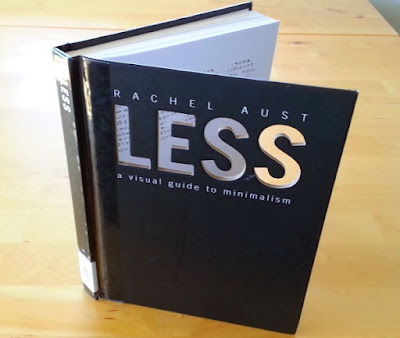Rachel Aust begins her book "Less: A visual guide to minimalism" by defining minimalism as:
Decide what to do with unwanted items by following a flow chart. Tips for daily, weekly and monthly tasks to stay minimal are in a handy table. Same for goal setting.
Diagrams of study workspaces and wardrobes help illustrate how to keep those traditionally cluttered areas more minimal. Even lists are presented in visually appealing ways or as a collection of icons - such as the 20 essential kitchen tools.
Reflecting her list of benefits of minimalism, Rachel also offers tips for other areas areas of life where less is more:
- unsubscribing from the idea that how much you own equates to your level of happiness.
- letting go of the unnecessary.
- the removal of distractions.
- a way to reclaim your time.
- an intentional way of living that allows you to identify what's important to you.
- simplicity.
- freedom.
How is it a "visual guide"
Flow charts, tables, photos and diagrams. Even if you didn't read a single paragraph of text there's still value in this book.Decide what to do with unwanted items by following a flow chart. Tips for daily, weekly and monthly tasks to stay minimal are in a handy table. Same for goal setting.
Diagrams of study workspaces and wardrobes help illustrate how to keep those traditionally cluttered areas more minimal. Even lists are presented in visually appealing ways or as a collection of icons - such as the 20 essential kitchen tools.
Not just decluttering
Yes, a fair chunk of the book is about decluttered decor and wardrobes. But that's not it.Reflecting her list of benefits of minimalism, Rachel also offers tips for other areas areas of life where less is more:
- Having a few clear goals and focussing your schedule to achieve them.
- Spending on what's important and habits to avoid wasteful spending.
- Digital decluttering. Simplifying the stuff on our computer and phone.
- Decluttering our mind and single-tasking rather multi-tasking



Comments
Post a Comment